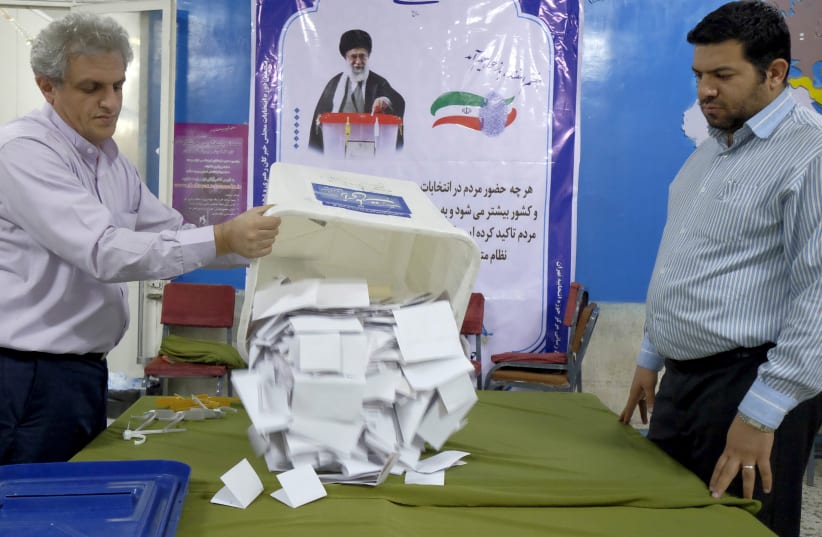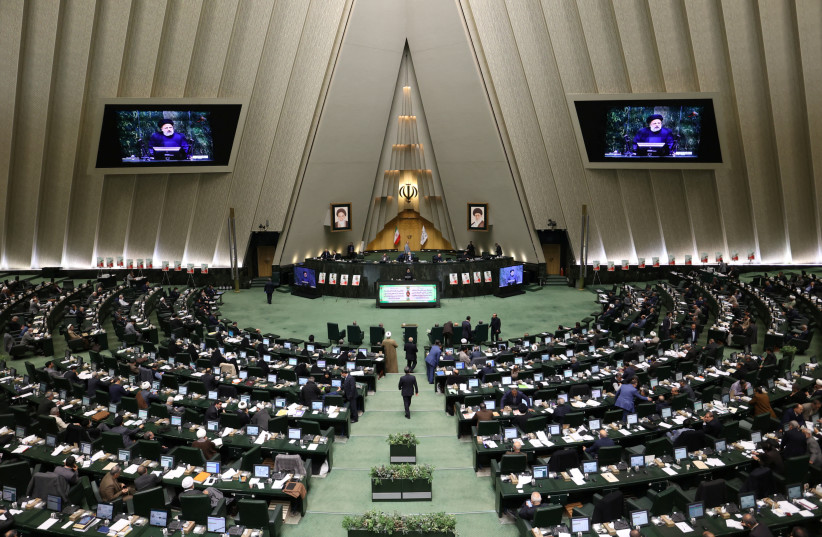Iranian activists increase calls to boycott upcoming elections
Polls conducted in recent weeks have found that voter participation in the upcoming elections in Iran may be as low as 15%.
By TZVI JOFFRE FEBRUARY 25, 2024 04:39

Narges Mohammadi, an Iranian human rights activist and Nobel Peace Prize laureate, called on Iranians to boycott the upcoming elections in Iran in a post on Saturday.
“The Islamic Republic deserves national sanctions and global condemnation. Sanctioning elections is not only a political necessity but also a moral duty,” wrote Mohammadi.
A post shared by Narges Mohammadi (@narges_mohamadi_51)
“Sanctioning elections under a despotic religious regime is not just a political move but also a moral obligation for freedom-loving and justice-seeking Iranians. The Islamic Republic, with its ruthless and brutal suppression, the killing of young people on the streets, the executions, and the imprisonment and torture of men and women, deserves national sanctions and global condemnation,” added Mohammadi.
“I, alongside the informed and proud people from all over Iran, from Sistan and Baluchestan to Kurdistan, from Khuzestan to Azerbaijan, will stand to declare the illegitimacy of the Islamic Republic and the divide within the oppressive regime and its people through the sanctioning of sham elections.”

Mohammadi, who has worked as a journalist and a human rights activist, has been arrested several times and has been in prison since 2021. From prison, she has published several statements and reports about human rights violations committed by the Khamenei regime.
On Friday, March 1, elections for the Majlis (parliament) and the Assembly of Experts will be held in Iran. The Assembly of Experts is the body in Iran that is tasked with appointing or dismissing the Supreme Leader of Iran, although the real extent of their power is uncertain and somewhat limited.
The candidates for both the Majlis and the Assembly of Experts are vetted by the Guardian Council, a council of 12 jurists half of whom are appointed by the supreme leader and half of whom are nominated by the Supreme Judicial Council and appointed by the Majlis. The council is also tasked with vetting legislation passed by the Majlis.
The Iranian Majlis consists of 290 seats, including one seat for a Zoroastrian representative, one seat for a Jewish representative, one seat representing the Assyrian and Chaldean Christians, one seat for Armenian Christians in northern Iran, and one seat for Armenian Christians in southern Iran. Iran is split into 207 electoral districts, with some of the larger districts having multiple representatives.
Former president Hassan Rouhani applied to run in the elections for the Assembly of Experts this year but his request was rejected by the Guardian Council. Rouhani has sent three letters to the council demanding that the council publish the reasons for his disqualification, but all three have remained unanswered.
Majority of Iranians opposed to or disinterested in upcoming elections
Several polls conducted in recent weeks have shown a disinterest or opposition to the elections in Iran.
The Iranian newspaper Vatan Emrooz reported last week that 52% of Iranians did not know when elections were going to be held and that another poll by the Iranian Students Polling Agency (ISPA) had found that only 36% of Iranians knew when election day was.
Another poll cited by several Iranian news agencies including ISNA and Khabar Online found that only about 30% of Iranians planned to vote in the upcoming elections, with participation in Tehran expected to be as low as 15%. Khabar Online deleted the poll after posting it, saying that it had been called and ordered to take the poll down as it was “against the law.”
The Netherlands-based GAMAAN group found that only 15% of Iranians plan to vote in the upcoming elections and 38% of Iranians were unaware of when the elections were being held. The poll additionally found that 39% of those who voted in the parliamentary elections in 2019 do not intend to vote in the upcoming elections.
The GAMAAN poll also found that if a referendum were to be held in Iran today with the question “Islamic Republic: Yes or No?” about 75% would vote “no,” 16% would vote “yes,” and about 9% were unsure. When asked what their preferred method of change is, one-third of respondents said protests were more effective, while 13% said elections were better, and another third said neither method was effective.
The poll also asked Iranians about the Israel-Hamas conflict, with 35% of Iranians blaming Hamas for starting the conflict, 20% blaming Israel, and 31% blaming both parties.
In recent comments to members of the reformist Islamic Iran Solidarity Party, former Iranian president Mohammad Khatami stressed that Iran is “very far from free, participatory and competitive elections,” according to the Jamaran news site.
Khatami expressed hopes that “the grievances, which are increasing day by day, will be taken seriously and will provide a basis for our society to witness free elections in the future.”
Reformist politician Mostafa Tajzadeh, who is imprisoned in the Evin Prison in Tehran, published a letter in the past week saying that Iranian Supreme Leader Ali Khamenei had “made elections meaningless and made elected institutions ineffective,” according to Radio Farda.
“Holding a referendum and at least free elections requires political foresight and moral courage, which the leader does not seem to have much use for,” added Tajzadeh, calling on reformists to boycott the elections. The imprisoned politician added that Khamenei was ignoring the “disastrous realities of Iran” and that most Iranians have decided to ignore Khamenei in turn.
Regime officials urge participation in elections amid disinterest
The apparent lack of interest in the upcoming elections has prompted Iranian leaders to increase their calls for citizens to vote in the elections.
Khamenei recently urged Iranians to take part in the elections, accusing the US and Israel, which he refers to as the “Arrogant Front,” or being against the elections.
“When America opposes the Islamic Republic system, it actually opposes the elections, it opposes the participation of the people, it opposes the coming of the people to the polls, it opposes the excitement and participation of the majority of the people in the elections,” said Khamenei. “They don’t say it explicitly, but they try to keep people away from the elections, discourage them, and disappoint them in various ways. There are many methods in this field.”
“Everyone should participate in the elections,” added Khamenei. “Elections are the main pillar of the Islamic Republic. The way to reform the country is elections. Those who are looking to fix the problems should turn to the elections. The right way is to vote.”
Hossein Salami, commander in chief of the Islamic Revolutionary Guard Corps (IRGC) called for participation in the elections, saying “In our society, all the basic and necessary institutions and elements of the country are formed based on democratic structures, and the high participation of the people in the elections indicates the existence of political vitality in the country.”
Content retrieved from: https://www.jpost.com/middle-east/iran-news/article-788661.